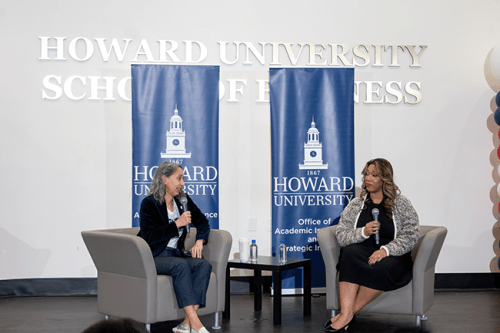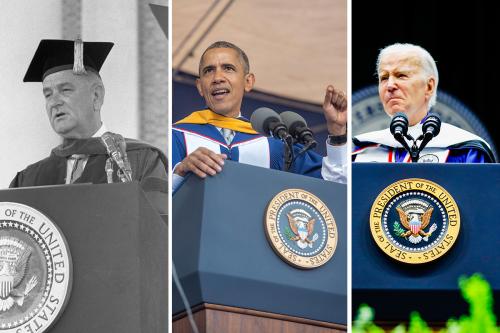WASHINGTON – Howard University Cathy Hughes School of Communications presents its 10th annual social media event September 30-October 1, 2021. The year’s Social Media Symposium is titled “From COVID-19 to the Ballot Box: Social Media and Race-Based Disinformation in 2020 and Beyond.” The two-day event focuses on dissecting how disinformation campaigns use systemic racism to discourage Black participation in COVID-19 vaccination protocols, voting and debates about reexamining police power following the murder of George Floyd.
This year’s symposium returns after a one-year hiatus, disrupted by the global coronavirus pandemic.
“After witnessing the turmoil brought on by massive disinformation campaigns in last year’s presidential election, the George Floyd and Black Lives Matters protests, ongoing pandemic, and multimedia, we felt that it was important to reconvene as a symposium to be part of the national conversation that interrogates how the Black community can mitigate the harm caused by social media-promoted disinformation campaigns,” said Ingrid Sturgis, chair of the Department of Media, Journalism and Film.
Sturgis will serve as symposium co-chair, along with Tia Tyree, Ph.D., acting associate dean, and Langmia Kehbuma, Ph.D., chair of the Department of Legal Strategic and Management Communications.
The NAACP has said disinformation – falsehoods and rumors, purposefully meant to cause harm – is “a perpetual attempt to tarnish and erode our democracy” and a critical issue for Black communities. It is also a growing media concern that is being investigated by such news organizations as the Associated Press, Politifact and the National Association of Black Journalists as well as scholars, community activists and political activists.
The virtual event will convene thought leaders across disciplines to engage in a public discussion and share research opportunities, policy recommendations, resources, as well as techniques and tools to counter disinformation.
Thursday’s Speaker
Mutale Nkonde is the leader and founder of AI for the People, a communications firm whose mission is to use art and culture to empower general audiences to combat racial bias in technological design. Prior to starting AI for the People, Nkonde worked in AI governance. During that time, she was part of the team that introduced the Algorithmic Accountability Act, the DEEP FAKES Accountability Act and the No Biometric Barriers to Housing Act, which was introduced to the U.S. House of Representatives in 2019 and reintroduced in 2021.
Friday’s Speaker
Yusuf Henriques is the founder and CEO of IndyGeneUS AI, a genomics company creating the world’s largest blockchain encrypted repository of indigenous and diasporic African clinical data for disease prevention and detection, drug discovery and development, clinical disease management, and precision health equity. As CEO, he leads strategic direction and partnerships as well as investor relations.
Other speakers and panelists include professor Yanick Rice Lamb, a health and environmental journalist, as well as associate professor Jennifer Thomas, journalist and Fulbright Scholar, who speaks internationally on disinformation.
The symposium will present an overview of the interdisciplinary work of the Howard University Digital Informers. Bahiyyah Muhammad, Ph.D., associate professor of criminology; Roger Caruth, Ph.D., assistant professor for the Department of Strategic Legal Management Communications; Keesha Middlemass, Ph.D., associate professor for the Department of Political Science; Angela Pashayan, a political science doctoral student; and Natalie Gayles, social work graduate student.
Register for the event here: https://howard.zoom.us/meeting/register/tZwtdOqopjgsGdW1pJ4FRfy-3Qk-tmImZbkR
###
About Howard University
Founded in 1867, Howard University is a private, research university that is comprised of 14 schools and colleges. Students pursue more than 140 programs of study leading to undergraduate, graduate and professional degrees. The University operates with a commitment to Excellence in Truth and Service and has produced one Schwarzman Scholar, three Marshall Scholars, four Rhodes Scholars, 12 Truman Scholars, 25 Pickering Fellows and more than 165 Fulbright recipients. Howard also produces more on-campus African American Ph.D. recipients than any other university in the United States. For more information on Howard University, visit www.howard.edu.
About the Department of Media, Journalism and Film
The Department of Media, Journalism and Film is the largest unit in the Cathy Hughes School of Communications at Howard University. Its faculty and alumni include award-winning, internationally renowned filmmakers, journalists, media producers, documentarians and research scholars. The department offers one of the top MFA programs in film and the only one at an HBCU. It was named as having one of the best university cinematography programs. USA Today and College Factual has ranked the journalism program among the top 20 nationally, and the National Association of Black Journalists ranked the program as No. 1 in the United States. The Broadcast Education Association honored WHBC student radio with the Signature Station Award. Howard is one of two universities in Washington and among seven HBCUs accredited by the Accrediting Council on Education in Journalism and Mass Communications.
Media Contact: Aaliyah Butler; aaliyah.butler@howard.edu




